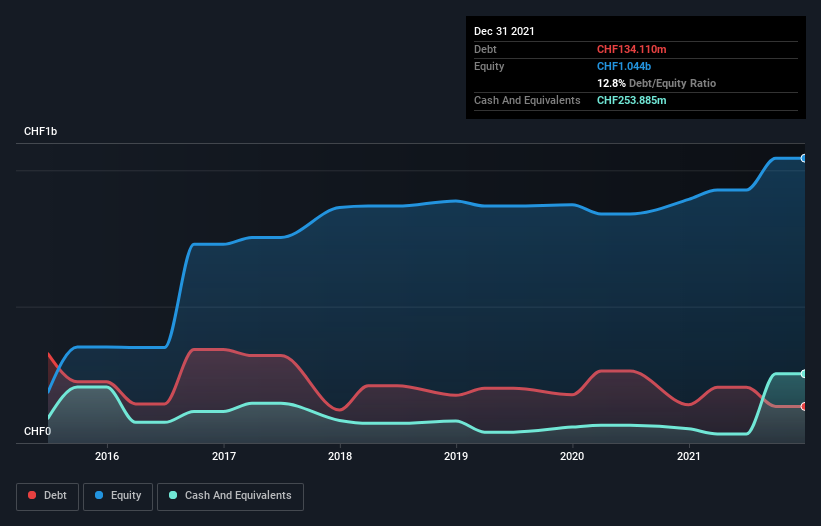Warren Buffett famously said, 'Volatility is far from synonymous with risk.' So it seems the smart money knows that debt - which is usually involved in bankruptcies - is a very important factor, when you assess how risky a company is. As with many other companies Arbonia AG (VTX:ARBN) makes use of debt. But the real question is whether this debt is making the company risky.
What Risk Does Debt Bring?
Debt assists a business until the business has trouble paying it off, either with new capital or with free cash flow. Part and parcel of capitalism is the process of 'creative destruction' where failed businesses are mercilessly liquidated by their bankers. However, a more frequent (but still costly) occurrence is where a company must issue shares at bargain-basement prices, permanently diluting shareholders, just to shore up its balance sheet. Of course, the upside of debt is that it often represents cheap capital, especially when it replaces dilution in a company with the ability to reinvest at high rates of return. The first thing to do when considering how much debt a business uses is to look at its cash and debt together.
See our latest analysis for Arbonia
What Is Arbonia's Net Debt?
The image below, which you can click on for greater detail, shows that Arbonia had debt of CHF134.1m at the end of December 2021, a reduction from CHF140.2m over a year. But on the other hand it also has CHF253.9m in cash, leading to a CHF119.8m net cash position.

A Look At Arbonia's Liabilities
According to the last reported balance sheet, Arbonia had liabilities of CHF284.6m due within 12 months, and liabilities of CHF294.3m due beyond 12 months. Offsetting these obligations, it had cash of CHF253.9m as well as receivables valued at CHF122.1m due within 12 months. So its liabilities outweigh the sum of its cash and (near-term) receivables by CHF203.0m.
Given Arbonia has a market capitalization of CHF1.22b, it's hard to believe these liabilities pose much threat. But there are sufficient liabilities that we would certainly recommend shareholders continue to monitor the balance sheet, going forward. While it does have liabilities worth noting, Arbonia also has more cash than debt, so we're pretty confident it can manage its debt safely. The balance sheet is clearly the area to focus on when you are analysing debt. But it is future earnings, more than anything, that will determine Arbonia's ability to maintain a healthy balance sheet going forward. So if you want to see what the professionals think, you might find this free report on analyst profit forecasts to be interesting.
In the last year Arbonia wasn't profitable at an EBIT level, but managed to grow its revenue by 14%, to CHF1.2b. That rate of growth is a bit slow for our taste, but it takes all types to make a world.
So How Risky Is Arbonia?
Although Arbonia had an earnings before interest and tax (EBIT) loss over the last twelve months, it made a statutory profit of CHF28m. So when you consider it has net cash, along with the statutory profit, the stock probably isn't as risky as it might seem, at least in the short term. Until we see some positive EBIT, we're a bit cautious of the stock, not least because of the rather modest revenue growth. There's no doubt that we learn most about debt from the balance sheet. However, not all investment risk resides within the balance sheet - far from it. We've identified 3 warning signs with Arbonia , and understanding them should be part of your investment process.
If, after all that, you're more interested in a fast growing company with a rock-solid balance sheet, then check out our list of net cash growth stocks without delay.
New: Manage All Your Stock Portfolios in One Place
We've created the ultimate portfolio companion for stock investors, and it's free.
• Connect an unlimited number of Portfolios and see your total in one currency
• Be alerted to new Warning Signs or Risks via email or mobile
• Track the Fair Value of your stocks
Have feedback on this article? Concerned about the content? Get in touch with us directly. Alternatively, email editorial-team (at) simplywallst.com.
This article by Simply Wall St is general in nature. We provide commentary based on historical data and analyst forecasts only using an unbiased methodology and our articles are not intended to be financial advice. It does not constitute a recommendation to buy or sell any stock, and does not take account of your objectives, or your financial situation. We aim to bring you long-term focused analysis driven by fundamental data. Note that our analysis may not factor in the latest price-sensitive company announcements or qualitative material. Simply Wall St has no position in any stocks mentioned.
About SWX:ARBN
Arbonia
Engages in supply of interior doors crafted from wood and glass in in Switzerland and internationally.
Reasonable growth potential and fair value.
Similar Companies
Market Insights
Community Narratives




